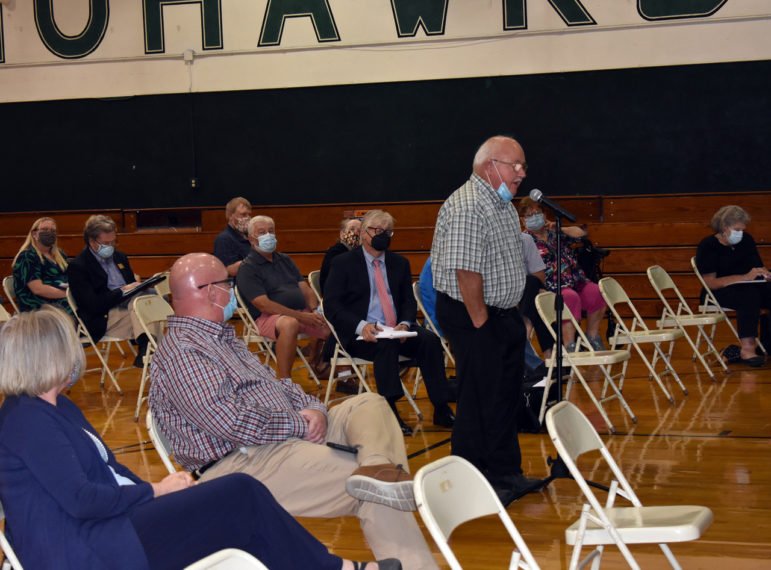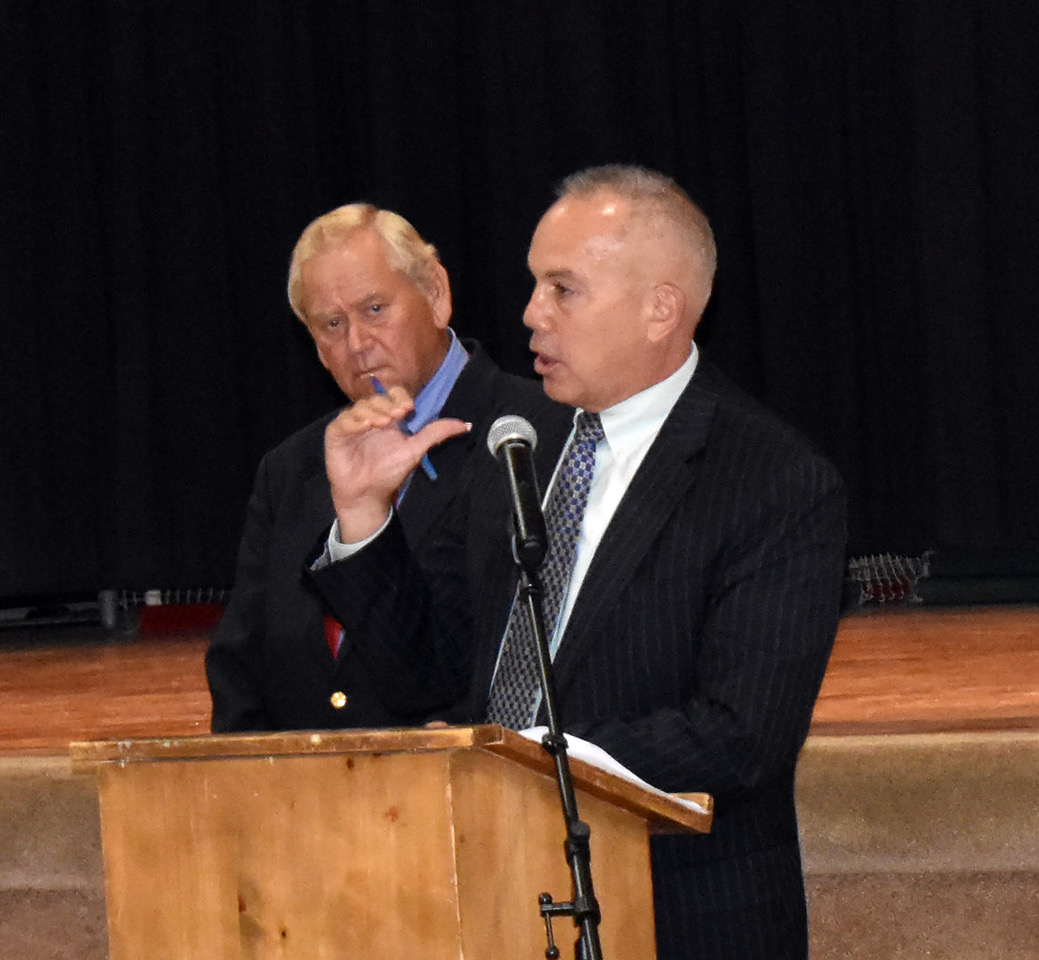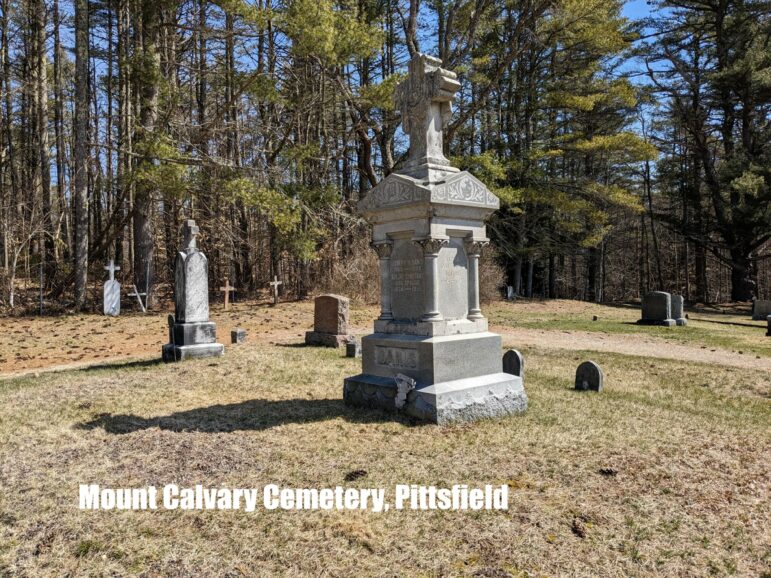
By Thomas P. Caldwell, InDepthNH.org
COLEBROOK — Speakers at the Sept. 14 public hearing on the proposed merger between Indian Stream Health Center and Upper Connecticut Valley Hospital expressed a range of reactions, from doubt to outright opposition to the move.
Taking place at Colebrook Primary School, rather than Colebrook Academy as originally publicized, the meeting drew mostly current and former employees of the nonprofit health center, which has been operating in the red and losing staff members at unsustainable levels, according to the board that oversees the clinic. Board Chair Gail Fisher has said the merger is essential to the future of primary care in the North Country.
The hearing by the Charitable Trusts Unit of the Attorney General’s Office is one of the final steps before the unit makes a decision on the merger. Thomas Donovan, director of Charitable Trusts, said his office will continue to accept testimony through Sept. 17, and will render a decision by November.
Under the terms of the merger proposal, the hospital would assume the assets and a limited amount of debt from Indian Stream, and it would establish a rural health clinic that would provide care for residents of the health center’s 850-square-mile service area.
Indian Stream Health Center currently operates as a federally qualified health center, a designation that affords patients a greatly reduced cost of care and special prescription prices. The switch to a rural health clinic will still provide reduced pricing, but the benefits will not be as extensive.
Dr. John Fothergill, who had helped Indian Stream obtain its designation as a federally qualified health center while he was associated with the organization, testified that losing that designation would be detrimental to the region. He also questioned whether the merger would end the so-called 340-B pharmacy benefit, along with a charity benefit that provides free care to patients with incomes below 300 percent of the federal poverty level.
In the merger agreement, the hospital agreed to continue those benefits, but Chief Executive Officer Scott Colby told the audience, “It is really based on income. We will offer a program that is unique to the retail pharmacy for individuals who qualify, based on 200 percent of the federal poverty line … part of that will be also applying for a new test to determine if you’re eligible for Medicare Expansion.”
He summed up, “It may not look exactly like what Indian Stream has today, but it is targeted to those in need similar to the 200 percent threshold the industry currently uses.”
Several speakers cited the current $13 per prescription benefit for those who qualify, saying they would be unable to pay the $700 per prescription that is normally charged for a particular medication.
“This will force more of our community members and friends into a level of poverty for healthcare that’s very difficult to overcome,” said one speaker. “We’ve seen this happen in our community before with the initial closure of the Ethan Allen factory and Balsams Resort. Many of those former employees and their families are just barely able to dig themselves out.”
When asked about the hospital’s three-year commitment to operate a rural health center, Colby said, “We plan on getting out of the RHC business, and when I say we, I mean the North Country. There are constant changes at the federal level … so we envision maintaining the primary care process as part of our mission and part of our DNA. We envision maintaining primary care into the foreseeable future. The three-year period is to memorialize that the landscape is changing at the federal level quite rapidly.”
Colebrook Selectman Ray Gorman said some of his constituents’ questions had been answered, but that he was hearing a lot of concerns about the changes. “Indian Stream did a great job taking care of people that were having a struggle,” he said. “As long as possible, please try to take care of people. They need those prescriptions so bad, and that is something Indian Stream did a great job with over and over.”
Former workers also spoke of how Indian Stream had worked with people who could not afford to pay, and the dedication of the staff. At the same time, many blamed the board for not addressing the problems that the center faced.
“When your turnover is 100 percent, there’s a problem at the top in your organization,” said Linda Stonner.
Yet providing the care and discounts that the speakers praised has resulted in deficits of between $133,000 and $134,000 per month, according to Fisher.
To those who spoke of the health center’s assets, Fisher and other officials pointed to the outstanding debt, which is continuing to rise and which the hospital is likely to have to write off.
Speakers also spoke of other partnerships that might have worked out, but the board has said that discussions with other organizations had fallen through.
Colby explained that, if Charitable Trusts approves the merger, it would not mean immediate changes because the patient records and prescriptions would have to be moved to the new entity. The pharmacy, he said, would remain in the same location, but would be operating under a new license once all the paperwork is completed.
T.P. Caldwell is a writer, editor, photographer, and videographer who formed and serves as project manager of the Liberty Independent Media Project. Contact him at liberty18@me.com.





